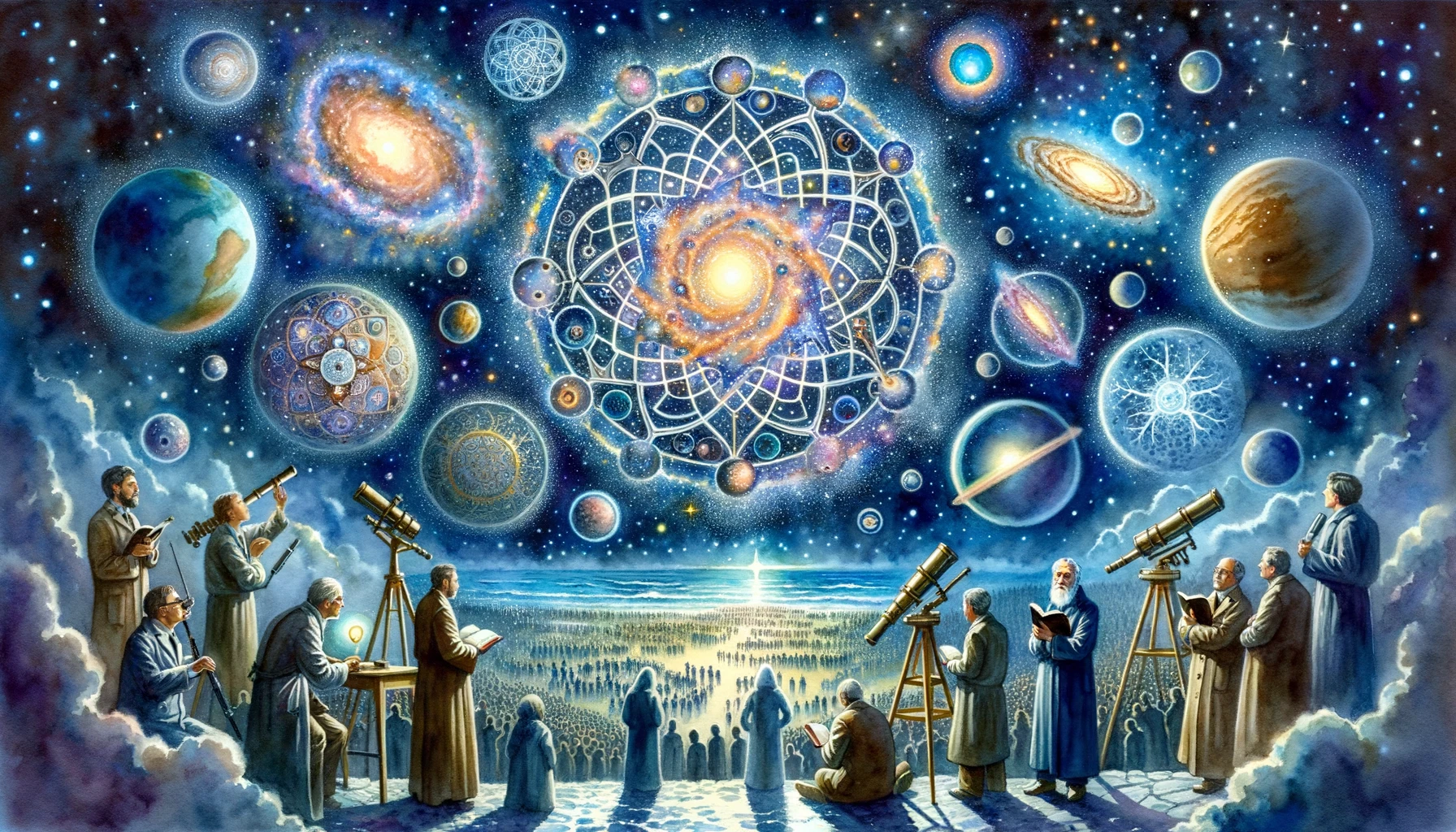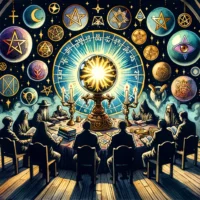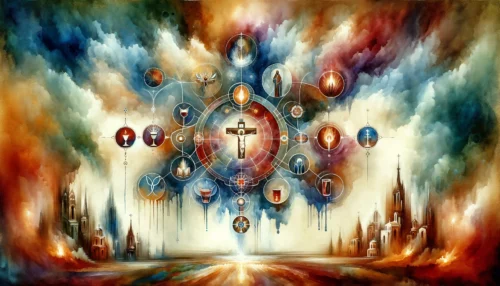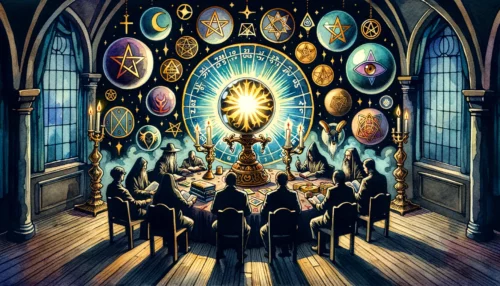Our exploration begins with an overview of the Intelligent Design Theory, exploring its core principles and their implications. We then bring the theory under the light of scripture, to understand how it resonates with Christian beliefs. Finally, we delve into a discussion on the interconnectedness of faith and science, aiming to bring clarity to this intricate discourse.
Unpacking the Intelligent Design Theory
Intelligent Design Theory (IDT) is a view that asserts certain features of the universe and living things are better explained by an intelligent cause rather than by undirected processes such as natural selection. IDT is a middle ground, finding its place between creationism on one end and atheistic evolution on the other.
The proponents of IDT argue that the complexity and intricacies we observe in the universe point to a Designer. For example, they often refer to the human eye with its intricate network of rods, cones, and nerves, all working together to provide vision. This system, they suggest, exhibits what is called “irreducible complexity.” This term refers to a single system composed of several interacting components, where the removal of any one component leads to the system’s malfunction. An intelligent designer, they argue, must have intentionally engineered such systems.
IDT often emphasizes the “fine-tuning” of the universe. The conditions that allow life in the universe can only occur when certain universal fundamental physical constants lie within a very narrow range, so that if any of several fundamental constants were only slightly different, the universe would be unlikely to be conducive to the establishment and development of matter, astronomical structures, elemental diversity, or life as it is presently understood. This suggests, according to IDT, that a Designer calibrated these constants with a purpose.
IDT differentiates itself from creationism in that it does not necessarily attribute this design to the God of the Bible. While creationists firmly assert that the biblical God is the Creator, IDT leaves the designer undefined, opening the door to various possibilities, from an unknown deity to advanced alien civilizations.
On the other side of the spectrum, atheistic evolution insists that all life, from the simplest microbe to the most complex human, came about by random mutation and natural selection without any divine intervention. IDT takes a stand against this purely materialistic view, affirming that the complexities we see around us can’t simply be the result of unguided processes.
As Christians, we see an overlap between our faith and IDT to the extent that it recognizes an intelligent cause behind the complexity of the universe. In the book of Genesis, God is portrayed as the master designer who meticulously crafted the heavens and the earth (Genesis 1-2). The Psalmist likewise marvels at the intricacy of human life, attributing it to God’s craftsmanship (Psalm 139:13-16). The IDT’s recognition of an intelligent cause echoes these biblical affirmations.
The Intelligent Design Theory posits that an intelligent cause rather than undirected processes explains the complexity of the universe and life. This theory emphasizes concepts like irreducible complexity and fine-tuning of the universe. IDT differentiates itself from creationism by not attributing the design specifically to God, leaving room for a range of possibilities. It also takes a stand against atheistic evolution, asserting that complexity can’t be the result of unguided processes. From a Christian perspective, there are elements of IDT that resonate with biblical descriptions of God as a masterful creator.
Intelligent Design and the Bible
As we explore Intelligent Design Theory and the Bible, it’s critical to acknowledge some key points of convergence and divergence. Firstly, the Intelligent Design Theory agrees with the Christian perspective that the universe didn’t come about by mere chance. It underscores the premise that there’s an intelligent cause behind the universe’s design, a position aligned with the biblical depiction of God as a creative force (Genesis 1-2). This belief in a purposeful design behind the cosmos is a common thread between the Intelligent Design Theory and Christian faith.
The Intelligent Design Theory’s concept of “irreducible complexity” has parallels in the Bible’s portrayals of divine craftsmanship. Psalm 139, for instance, expresses the wonder of human design, suggesting an intricate weaving together of parts that could not function independently. Just as the Bible marvels at this complexity, so does the Intelligent Design Theory perceive intricate systems within nature as evidence of a designer.
While there’s overlap, some divergence also exists. The Intelligent Design Theory leaves the identity of the designer undefined. It refrains from attributing the observed design to any particular deity or intelligence. This lack of specificity stands in contrast to the Christian faith, which unequivocally attributes the universe’s design to the God of the Bible (Genesis 1:1). This God is not a nebulous, unknown entity but a personal God who is involved with His creation, a God who even sent His Son to redeem mankind (John 3:16).
Another point of divergence arises when it comes to the method of creation. Intelligent Design Theory, while asserting an intelligent cause, doesn’t specify the mode of creation. It doesn’t discuss whether the universe came into existence in six literal days as a Young Earth creationist would assert or over billions of years as Old Earth creationists and Theistic Evolutionists believe. The Bible, on the other hand, provides a specific narrative of creation in Genesis, though interpretations of the timeline vary among Christian believers.
Intelligent Design Theory emerged from scientific and philosophical discourse, not theological deliberation. It seeks to provide an answer to the complexity of the universe that both theists and agnostics could find plausible. This sets it apart from the biblical narrative, which originates from divine revelation, as Christians believe, and proclaims not just a Creator, but a loving, redemptive God.
Intelligent Design Theory aligns with the Christian belief in an intelligent cause behind the universe’s design and appreciates its intricate complexities. However, it diverges by leaving the designer’s identity undefined, not specifying the mode of creation, and not explicitly recognizing a personal, loving, and redemptive God. Despite these differences, Intelligent Design Theory’s theistic-leaning perspective provides a platform for meaningful conversation about the origins of the universe within the realm of both science and faith.
Faith Meets Science: The Ongoing Dialogue
When it comes to reconciling faith and science, Intelligent Design Theory offers an interesting perspective. This theory, as a scientific argument, recognizes an intelligent cause in the universe while maintaining a distance from religious doctrines or specifics about who the designer is. This quality makes it unique in the discussion about faith and science. For Christians, the question arises: how can faith and science – specifically as it relates to the Intelligent Design Theory – engage in productive dialogue?
Biblical faith asserts that God created the world and everything in it (Genesis 1-2). It proclaims that the universe speaks of God’s glory (Psalm 19:1) and His invisible attributes, eternal power, and divine nature are clearly seen in what has been made (Romans 1:20). On the other hand, science, including the Intelligent Design Theory, seeks to understand the world through empirical observation and analysis. The challenge, and the opportunity, lies in how we bring these perspectives together.
When considering Intelligent Design Theory, Christians can appreciate its recognition of complexity in the universe that suggests an intelligent cause. It brings to the forefront the conversation about a designer and challenges purely materialistic explanations. In this, there is a bridge where science acknowledges a premise that believers hold – that there is a purposeful design in the universe, even if the identity of the designer is left unspecified.
On the other hand, while recognizing this shared space, it’s vital for Christians to affirm the truth of a personal, loving God who is the Designer. The Bible goes beyond merely recognizing an intelligent designer to reveal a God who cares deeply for His creation (Matthew 6:26). In fact, He cares so much that He entered into human history in the person of Jesus Christ to redeem it (John 3:16). This personal and redemptive aspect is absent in Intelligent Design Theory but central to Christian faith.
Another opportunity for dialogue comes with the question of how this design came into being. The Intelligent Design Theory doesn’t specify the ‘how’ of creation. While the Bible offers a creation account, interpretations among Christians vary. Some view the days in Genesis as literal 24-hour periods, while others see them as metaphorical. This opens space for conversations about the interplay of divine action and natural processes in creation, allowing for a nuanced understanding of both science and faith.
In the intersection of faith and science, Christians can appreciate Intelligent Design Theory’s acknowledgment of an intelligent cause and challenge to materialistic explanations. This doesn’t diminish the uniqueness of Christian faith, but rather encourages dialogue and understanding in the pursuit of truth about our world and universe.
Faith and science engage in an ongoing dialogue, with Intelligent Design Theory contributing to this conversation. The theory aligns with Christian belief in an intelligent cause behind the universe’s design but falls short of recognizing a personal, loving God. It opens room for discussion on the process of creation. While maintaining our unique Christian convictions, there’s value in engaging with Intelligent Design Theory as it challenges materialistic explanations and encourages the pursuit of understanding our universe.
The Harmony of Heaven and Earth
The Intelligent Design Theory, with its perspective of an intelligent cause behind the universe’s intricacies, has provided a unique contribution to the faith-science conversation. While it doesn’t specify the designer and is silent on the mode of creation, it has helped bring discussions of design and purpose into scientific discourse. As Christians, we affirm the design in the universe as an expression of the Creator’s wisdom and creativity, while also acknowledging God’s personal, loving, and redemptive nature. The conversation between faith and science is not a debate to be won, but a dialogue to enrich our understanding of God’s wonderful creation.
To stimulate further thought:
- How does understanding Intelligent Design Theory strengthen your appreciation of God’s creation?
- What role does your Christian faith play in understanding and appreciating scientific theories and discoveries?
- How can Christians effectively participate in the faith-science dialogue without compromising their core beliefs?
May we continue to marvel at the handiwork of God in the universe and take joy in learning more about His creation, for His glory is indeed declared in the heavens and throughout the earth.














